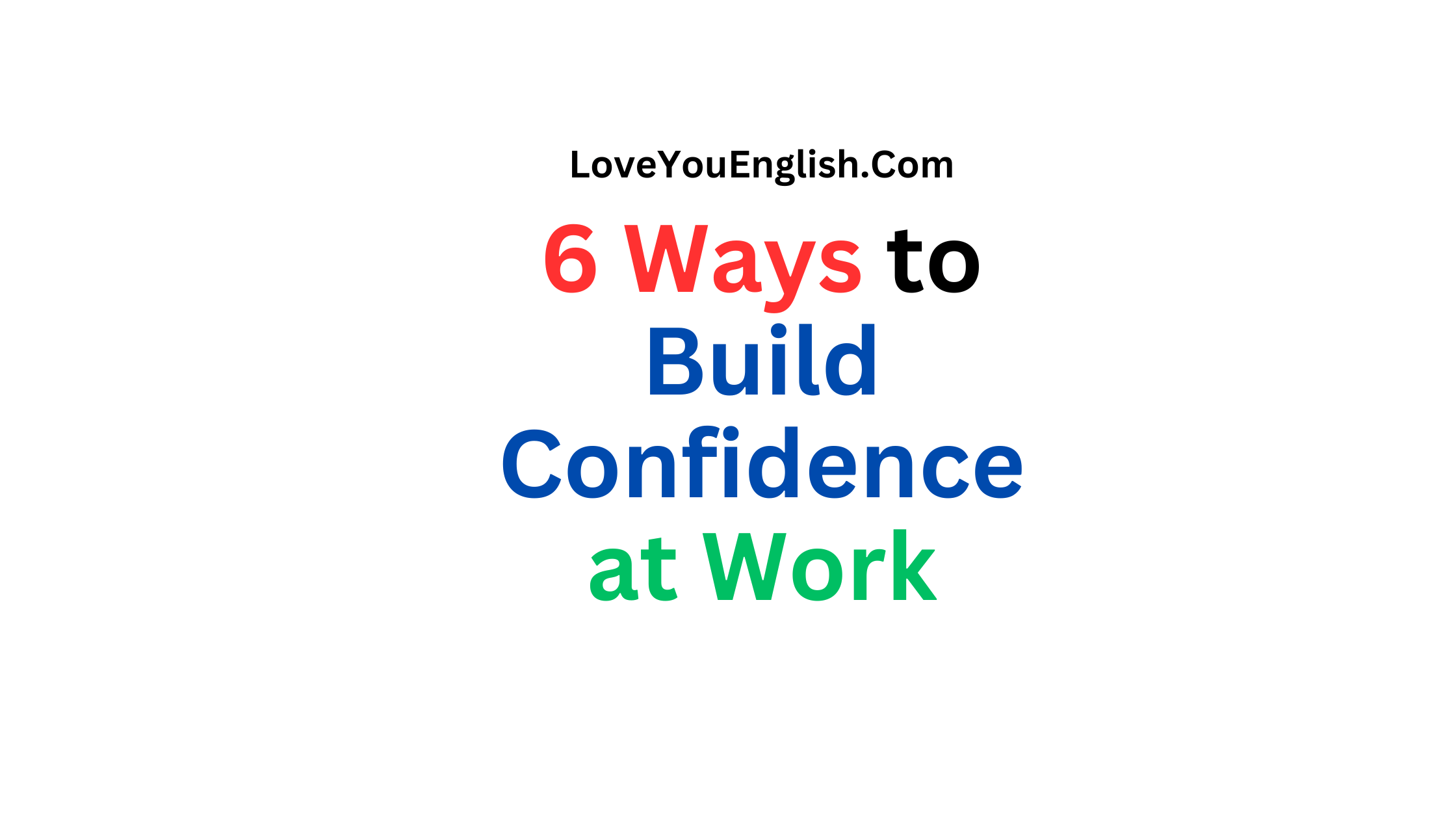6 Ways to Build Confidence at Work
6 Ways to Build Confidence at Work
Having confidence is super important for doing well at your job.
When you believe in yourself, you’re more likely to try new things, share your ideas in meetings, go for a promotion, and do a great job overall.
But lots of people have a hard time feeling sure of themselves at work.
The cool thing is that confidence is something you can work on and get better at with practice and by using the right techniques.
In this blog post, we’re going to check out 6 awesome ways to feel more confident at work.
If you try these tips, you can feel better about yourself, do better at your job, and move up in your career.
Develop Your Skills and Knowledge
One of the most fundamental ways to build confidence at work is to continuously develop your skills and expand your knowledge base.
When you know you’re competent and well-informed in your field, it naturally boosts your self-assurance.
Here are some specific strategies for skill and knowledge development:
a) Stay up to date with industry trends:
Regularly read industry publications, blogs, and news sources to stay informed about the latest developments in your field. This will help you feel more confident in discussions with colleagues and clients.
b) Take online courses or attend workshops:
Look for opportunities to learn new skills or deepen your existing knowledge. Many online platforms offer affordable courses on a wide range of topics. Your company may also offer training programs or be willing to sponsor your participation in relevant workshops or conferences.
c) Seek out challenging projects:
Volunteer for assignments that push you out of your comfort zone. While these may feel daunting at first, successfully completing challenging tasks will significantly boost your confidence over time.
d) Practice and refine your skills:
Identify areas where you want to improve and dedicate time to practice. This could involve role-playing difficult conversations, working on your public speaking skills, or honing your technical abilities.
e) Learn from your colleagues:
Don’t be afraid to ask questions and learn from those around you. Most people are happy to share their knowledge, and this can be an excellent way to pick up new skills and insights.
Remember, becoming more skilled and knowledgeable is an ongoing process.
Make learning a habit, and you’ll find your confidence growing steadily over time.
You may want to read more:
- 10 Common Interview Questions and Answers in English
- 6 Ways to Build Confidence at Work
- How to Prepare for a Job Interview in English
- What Is Personal Development and Why Is It Important?
- Interview Vocabulary: Words Related to Job Interviews
- Linking Short-Term Goals to Long-Term Career Goals
Set and Achieve Small Goals
Setting and achieving goals, even small ones, can provide a significant boost to your confidence.
Each time you accomplish something you set out to do, it reinforces your belief in your abilities.
Here’s how to effectively use goal-setting to build confidence:
a) Start with small, achievable goals:
Begin by setting goals that are well within your reach. These could be as simple as completing a specific task by the end of the day or speaking up at least once in your next team meeting.
b) Break larger goals into smaller steps:
If you have a big project or ambitious goal, break it down into smaller, manageable tasks. This makes the overall goal less overwhelming and gives you more opportunities to experience success along the way.
c) Track your progress:
Keep a record of your goals and your progress towards them. This could be a simple to-do list, a goal-tracking app, or a more detailed journal. Seeing your accomplishments in writing can be a powerful confidence booster.
d) Celebrate your achievements:
Take time to acknowledge and celebrate when you achieve your goals, no matter how small. This positive reinforcement will help build your confidence and motivation.
e) Gradually increase the difficulty:
As you build momentum and confidence with smaller goals, start setting slightly more challenging objectives. This gradual progression will help you tackle bigger goals over time without feeling overwhelmed.
f) Learn from setbacks:
If you don’t achieve a goal, don’t view it as a failure. Instead, analyze what happened, learn from the experience, and use that knowledge to set more realistic goals or develop better strategies for next time.
By consistently setting and achieving goals, you’ll build a track record of success that will naturally boost your confidence in your abilities.
Practice Positive Self-Talk
The way we talk to ourselves has a profound impact on our confidence levels.
Negative self-talk can undermine our self-esteem, while positive self-talk can boost our confidence and resilience.
Here are some strategies for cultivating more positive self-talk:
a) Recognize negative self-talk:
The first step is becoming aware of your inner dialogue. Pay attention to the thoughts that run through your mind, especially in challenging situations at work.
b) Challenge negative thoughts:
When you catch yourself thinking negatively, pause and question those thoughts. Are they based on facts or just fears? Is there another way to look at the situation?
c) Reframe negative statements:
Try to rephrase negative thoughts in a more positive or neutral way. For example, instead of “I’m terrible at public speaking,” try “Public speaking is challenging, but I’m working on improving my skills.”
d) Use affirmations:
Develop a set of positive affirmations related to your work. These could be statements like “I am capable of handling challenges” or “I have valuable contributions to make.” Repeat these to yourself regularly, especially when facing difficult situations.
e) Focus on your strengths:
Make a list of your skills, accomplishments, and positive qualities. Review this list regularly to remind yourself of your capabilities.
f) Practice self-compassion:
Treat yourself with the same kindness and understanding you would offer a friend. Remember that everyone makes mistakes and faces challenges at work.
g) Visualize success:
Before important tasks or meetings, take a moment to visualize yourself performing well. This mental rehearsal can help boost your confidence and prepare you for success.
Remember, changing your self-talk takes time and practice.
Be patient with yourself and consistently work on cultivating a more positive inner dialogue.
Embrace Failure and Learn from Mistakes
Fear of failure can be a major obstacle to confidence at work. However, reframing how you view failure and mistakes can actually help build your confidence over time.
Here’s how to adopt a more constructive approach to failure:
a) Recognize that failure is part of growth:
Understand that making mistakes and experiencing setbacks are normal parts of any career. They provide valuable opportunities for learning and improvement.
b) Analyze failures objectively:
When things don’t go as planned, take a step back and analyze the situation objectively. What went wrong? What could you do differently next time? This analytical approach helps you learn from the experience rather than dwelling on negative emotions.
c) Share your learnings:
Don’t be afraid to discuss your mistakes with colleagues or supervisors. Sharing what you’ve learned demonstrates maturity and a growth mindset, which can actually enhance others’ confidence in you.
d) Celebrate the attempt:
Even if an endeavor doesn’t succeed, give yourself credit for trying. Taking risks and pushing yourself out of your comfort zone is valuable in itself.
e) Keep failures in perspective:
Remember that one mistake or failure doesn’t define your entire career or capabilities. Try to view each experience as just one data point in your overall professional journey.
f) Seek feedback:
After a setback, ask for constructive feedback from colleagues or supervisors. This can provide valuable insights and show your commitment to improvement.
g) Practice resilience:
Develop strategies to bounce back from failures quickly. This might include taking a short break, engaging in a positive activity, or reminding yourself of past successes.
By embracing failure as a learning opportunity, you’ll become more resilient and confident in your ability to handle challenges at work.
Improve Your Body Language and Presentation
Your physical presence and how you carry yourself can significantly impact both how others perceive you and how you feel about yourself.
Improving your body language and presentation can help you project and feel more confident at work.
Here are some tips to enhance your physical presence:
a) Practice good posture:
Stand or sit up straight with your shoulders back and your head held high. Good posture not only makes you appear more confident but can actually make you feel more confident too.
b) Make eye contact:
When speaking with others, maintain appropriate eye contact. This conveys confidence and engagement.
c) Use a firm handshake:
When meeting people in professional settings, a firm (but not overpowering) handshake can make a strong first impression.
d) Speak clearly and at a measured pace:
Take your time when speaking and enunciate clearly. Avoid rushing your words, which can make you seem nervous.
e) Use open body language:
Avoid crossing your arms or legs, which can make you appear closed off. Instead, try to keep an open stance.
f) Dress professionally:
Wear clothes that are appropriate for your workplace and make you feel confident. When you look good, you’re more likely to feel good.
g) Smile:
A genuine smile can make you appear approachable and confident. It can also help you feel more positive.
h) Practice power poses:
Before important meetings or presentations, try striking a “power pose” (such as standing with your hands on your hips) for a few minutes. Research suggests this can help boost your confidence.
i) Work on your public speaking skills:
If public speaking makes you nervous, look for opportunities to practice. Consider joining a group like Toastmasters to develop your skills in a supportive environment.
Remember, changing your body language might feel unnatural at first.
But with practice, these behaviors will become more automatic and can significantly boost your confidence over time.
Build a Support Network
Having a strong support network at work can greatly enhance your confidence.
Knowing that you have people you can turn to for advice, support, or collaboration can make you feel more secure in your role and abilities.
Here are some ways to build and leverage a support network:
a) Cultivate relationships with colleagues:
Take time to get to know your coworkers. Engage in small talk, offer help when you can, and show genuine interest in their work and lives.
b) Find a mentor:
Look for someone more experienced in your field who can offer guidance and support. This could be someone within your organization or an industry contact.
c) Become a mentor:
Offering support and guidance to others can boost your own confidence by reinforcing your knowledge and skills.
d) Join professional associations:
Getting involved in industry groups can help you build a network beyond your immediate workplace and gain valuable insights and support.
e) Participate in team-building activities:
Take part in work social events or team-building exercises. These can help you build stronger relationships with colleagues.
f) Seek out feedback:
Regularly ask for constructive feedback from supervisors and trusted colleagues. This shows your commitment to improvement and can provide valuable confidence-boosting affirmation.
g) Create a personal board of advisors:
Identify a small group of trusted individuals (both within and outside your workplace) who you can turn to for advice and support in different areas of your career.
h) Use social media professionally:
Platforms like LinkedIn can be great for building and maintaining professional relationships. Share industry insights, engage with others’ posts, and stay connected with colleagues past and present.
i) Offer support to others:
Be willing to help your colleagues when they need it. This not only strengthens relationships but can also reinforce your own skills and value.
j) Practice gratitude:
Regularly express appreciation to those who support you at work. This helps strengthen relationships and creates a positive work environment.
Remember, building a support network takes time and effort, but the confidence boost it provides is well worth it.
Conclusion
Gaining confidence at work is a journey that requires hard work and stepping out of your comfort zone.
By focusing on improving your skills, setting realistic goals, staying positive, learning from mistakes, working on your presence, and building a support system, you can boost your confidence over time.
Remember, even successful people have moments of doubt. True confidence is about believing in yourself and being able to handle challenges.
It takes time and effort, but with persistence, you’ll see progress in your career. Just start small, stay consistent, and celebrate your achievements along the way.
Keep taking action and you’ll build the confidence you need to succeed at work.
_______________________________________







